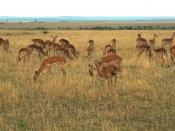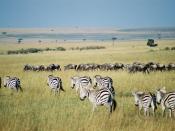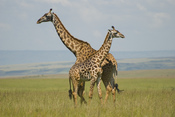Kenya is a landlocked country in the continent of South Africa. It is surrounded by five countries. Kenya is a popular destination for tourists travelling to Africa as it offers tourists camel safaris, trekking, game fishing, white water rafting, ballooning, diving, wind surfing and donkey safaris. The major ecotourist attraction in Africa is one of the 40 national parks in Kenya that offer an insight into the lives of animals and their habitat. Unfortunately, 70% of national parks and game reserves are on pastoral lands, particularly Masai land.
Ecotourism is a major contributor to Kenya's economy. There are 55 000 people employed in the wildlife industry alone. And the wildlife market generates half of the country's foreign exchange earnings. Therefore, the wildlife market is the biggest contributor to Kenya's foreign economy.
Ecotourism has had both positive and negative impacts on the wildlife environment, people and economy of Kenya. The economy, the livelihood of the people, and the maintenance of the ecosystem have had positive impacts on Kenya.
Kenya's foreign exchange earnings are from tourism and 80% of the tourist market is drawn from wildlife. Also, the Masai herders who inhabit bush land north of Mt Kenya have allocated 8 765 hectares of their land, (which teems with elephants, zebras, giraffes, wild cats) for wildlife conservations. The revenue from tourist lodge tours then go back to the community which is used for children scholarships, maintenance, development and general income. Therefore, the above have had a sustainable impact on tourism.
Ecotourism also promotes sustainability of the wildlife. In Kenya, a living elephant is worth around $14 375 for every year of its life whilst the ivory from an elephant is worth about $1000. Each elephants herd earns as much as $610 000 each year. This promotes the maintenance of the elephants, minimises...



Thanks
After reading this essay, or rather an article(for me), I feel very well-informed. Just like watching National Geography! Thank You very much.
2 out of 2 people found this comment useful.